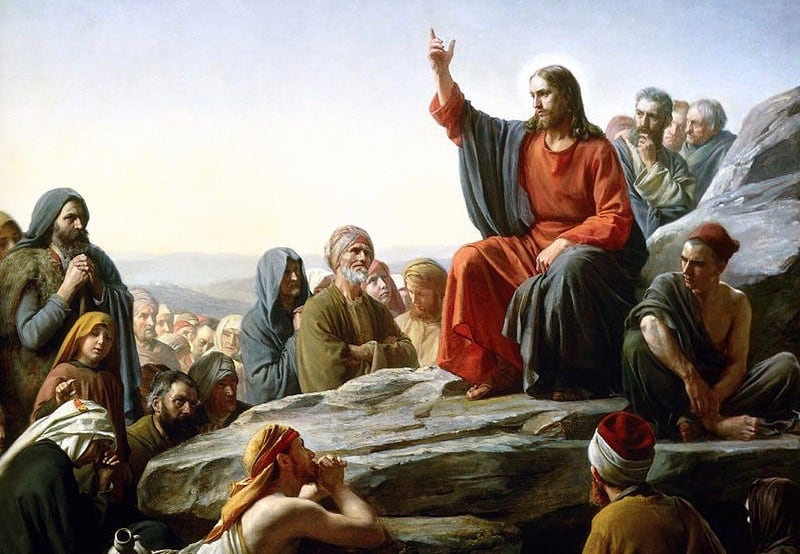1. How is a person saved, according to the Bible?
A person is saved and forgiven of his or her sins when he or she ceases to trust in self, cries out to God, and relies only on Jesus’ substitutionary death as payment for all wrongdoings committed.
See “How to Become a Christian.”
2. What is the difference between the kind of faith people often think of today and biblical faith?
Many people think of faith as a blind leap of faith—believing without evidence, or, put another way, believing something without having good reasons for doing so. Biblical faith is reasonable. Moreover, it isn’t just believing with one’s mind, but actively relying on Christ for forgiveness of sins and eternal life (see the answer to question #1, above).
3. Why do religions typically encourage their adherents to follow specific ethical teachings such as don’t steal, lie, or murder?
Religions do this because they see good works as the key to earning merit with God and a place in heaven after death.
4. What is unique about ethical teachings in Christianity? See Exodus 20:1-20; Deuteronomy 5; Matthew 5:17-48; Galatians 3:10-29.
Ethical teachings in Christianity do not merely help us know how to live; but they teach us about God’s holy character, which is perfect, and human sin, which is universal in the human family and renders each person guilty and deserving of hell before a holy God. Accordingly, ethical teachings in Christianity guide people to see their need of a Savior and their hopeless state without Christ’s provision of salvation through His death on the cross.
5. Why is Jesus Christ the central focus of Christianity?
See “The Centrality of Christ.”
6. What is the Bible?
The Bible is a book of divinely revealed truth about God and His activity in history.
7. When someone says, “The Bible is not primarily a book of science, history, philosophy, or moral teachings, but a book of faith,” why does this diminish the Bible’s authority, even though this may not be what the speaker intended?
Strictly speaking, the Bible is not a book of faith, but, as we said in response to question # 6, a book of truth through which God tells us about Himself and His activity in history. Because the Bible is true, when it speaks to issues involving science, history, philosophy, morality, or some other subject, it does so with 100 percent accuracy. We can trust it fully.
8. What do we mean when we say God has revealed Himself in history?
When God revealed Himself to humanity, He did so through His activity in history. The Bible is, among other things, an accurate written record of these events.
9. When we read and interpret the Bible, what do we need to remember about the various literary forms we find in it—literary forms like poetry, prose, metaphors, and so forth?
These and other literary forms communicate truth in a variety of ways. Accurately interpreting a passage of Scripture involves taking into account the literary forms and devices used. Here’s one example used hyperboles in Matthew 5:29-30 and 18:8-9. Since He obviously spoke using hyperboles, we know He wasn’t telling us to literally pluck out eyes or to cut off hands and feet. He was telling to avoid sinning, even if we have to make sacrifices to do so. Here is an excellent article about literary forms and devices in Scripture. Here is an article highlighting 15 metaphors in God’s Word.
10. How has God revealed Himself? See Psalm 19:1-6; Romans 1:18-23; 2 Timothy 3:16-17; 2 Peter 1:20-21; Psalm 19:7-11; John 1:1-5,14; Hebrews 1:1-4.
Through nature, through prophets and other spokesmen who recorded in writing the messages God gave them, through events in which He was involved in history, and ultimately through His Son, Jesus Christ.
11. The above passages demonstrate that God has revealed Himself in nature, the written Word—the Bible, and His Son, Jesus Christ. Included in the second of these, the Bible, are historical accounts of God’s interacting with real people in history.
With whom did God interact in these passages?
- Genesis 12:1—Abram (Abraham)
- Genesis 15:1—Abram (Abraham)
- Genesis 17:1-2—Abram (Abraham)
- Genesis 22:1-19—Abraham
- Genesis 28:10-22—Jacob
- Exodus 3:1-6—Moses
- 1 Samuel 15:10—Samuel
- 1 Kings 6:11-13—Solomon
- 1 Kings 17:8-9—Elijah
- 1 Kings 21:17-18—Elijah
- Luke 1:5-13—Zacharias
- Luke 1:26-29—Mary
- Matthew 1:18-25—Joseph
- John 1:1-4,14—everyone, the people of the world
- John 1:10-13—His own people
- Acts 9:1-5—Saul (Paul)
- 1 Corinthians 15:3-8—Cephas (Peter), the disciples, 500 followers of Christ, James, the apostles, Paul
- 2 Peter 1:21—holy men, God’s spokesmen who recorded Scripture
- 1 John 1:1-4—John and the rest of the apostles
- Revelation 1:1-2—John
Of course, the above represents only a partial list, a mere fraction of interactions we know about from the Scriptures.
In addition the people represented in the passages in the list above, you’ll find that many Bible books bearing the names of specific people record encounters those very people had with God. All of these are real events that happened in space-time history. Here are some examples.
- Job 38:1
- Isaiah 38:4;
- Jeremiah 1:1-10;
- Ezekiel 1:3;
- Daniel 2:14-19;
- Hosea 1:1;
- Joel 1:1;
- Amos 7:8;
- Obadiah 1:1;
- Jonah 1:1; 3:1; 4:1-11;
- Micah 1:1;
- Nahum 1:1,12;
- Habakkuk 1:1; 2:2-4;
- Zephaniah 1:1;
- Haggai 1:3;
- Zechariah 1:1;
- Malachi 1:1
top image: Daniel in the Lions’ Den
This page is a part of a larger article. Copyright © 2017 by B. Nathaniel Sullivan. All rights reserved.

